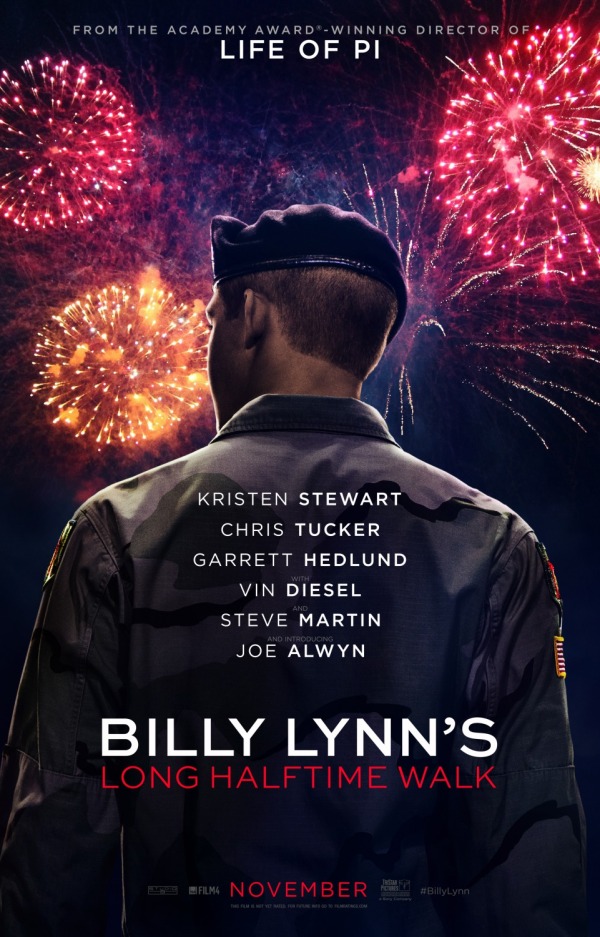BILLY LYNN’S LONG HALFTIME WALK (2016, directed by Ang Lee, 110 minutes, U.S.)
![]() BY DAN BUSKIRK FILM CRITIC Ang Lee’s latest exemplifies the sort of intimate drama on a grand scale in which the director specializes. With Billy Lynn’s Long Halftime Walk, based on the best-selling novel by Ben Fountain, Lee again dazzles us with visceral, ambitious visuals, but the story at its heart seems just as simplistic as the empty patriotism against which the film rails.
BY DAN BUSKIRK FILM CRITIC Ang Lee’s latest exemplifies the sort of intimate drama on a grand scale in which the director specializes. With Billy Lynn’s Long Halftime Walk, based on the best-selling novel by Ben Fountain, Lee again dazzles us with visceral, ambitious visuals, but the story at its heart seems just as simplistic as the empty patriotism against which the film rails.
It is brilliantly constructed, a time capsule set in the early years of our 21st century war on Iraq, with the scene at Texas Stadium being a microcosm of America’s attitudes to the war and those who fight it. Much like Alejandro G. Iñárritu’s Birdman, we are guided around backstage and through the stadium as varied types and attitudes push themselves into our path, all seen through the eyes of the decorated hero of the title, played with a certain blank-eyed wonder by young British actor Joe Alwyn in his film debut. Billy has been part of a promotional tour, seemingly to promote the war effort but he remains haunted by the battlefield events that earned him his medals on what he describes as “the worst day of his life.” Flashbacks drag us slowly towards those events as a the circus of American life cheers and courses around him and his uniformed squad.
If our soldier in the middle of this whirlwind is a little blank it may be because the director wants him to be our strapped-in seat for the tour de force supposedly delivered by the ground-breaking one hundred gazillion frame per second technology that was used for the film. (It seemed barely perceptible seen at the conventional frame rate it will have on its regular run. And why this crazy chase for frame rates? Did anyone complain they didn’t like The Godfather because the picture wasn’t clear enough?) It fact, more than any Ang Lee film, its pro-troop perspective seems designed to be inoffensive and simplistic as a mass audience commercially demands.
At points the film is both hyper-realistic and preposterous. The stadium atmosphere is incredibly believable yet does the Texas stadium really contain a gang of army-hating drunks who are going to make gay slurs at the soldiers during the game? The halftime show with Destiny’s Child (seen only from behind and played by actors) has a real “you are there” quality, but would the choreographers give the soldiers their directions seconds before they were to hit stage?
Some bits go for pure fantasy. Billy finds time for love at the stadium with a ripe-as-a-melon swoony-eyed Cowboy cheerleader. In a more serious bit Steve Martin plays the fictional Cowboys team owner who makes a case for a certain retail patriotism but the film’s over-written screenplay (by first-timer Jean-Christophe Castelli) sets up all these little skits a bit too schematically to finesse any of his points.
Throw in Billy’s tragic, facially-scarred anti-war sister (Kristen Stewart emphasizing her general glumness) it’s no surprise that the camaraderie of the platoon is made the most inviting path for Billy. In battle Billy was led by a captain played by Vin Diesel, who is one of those types plentiful in war films, the Zen warrior: part soldier, part comparative religions major. When I say “comradeship” I mean Diesel is a captain who literally grabs each soldier by the shoulders, looks them square in the eye and tells them he loves them before going into battle. With the madhouse U.S. society has become, of course the only sane thing is to go back to war. For your buddies! This might have been that mindset in 2006, but is that the mindset now? I’m not saying that Ang Lee’s film was funded by the U.S. Army, but if it had been I imagine they’d be very pleased by the results. Lee’s Billy Lynn may purport to honor the men but by continuing to celebrate the ennobling qualities of war it does more than its part to create them too.

